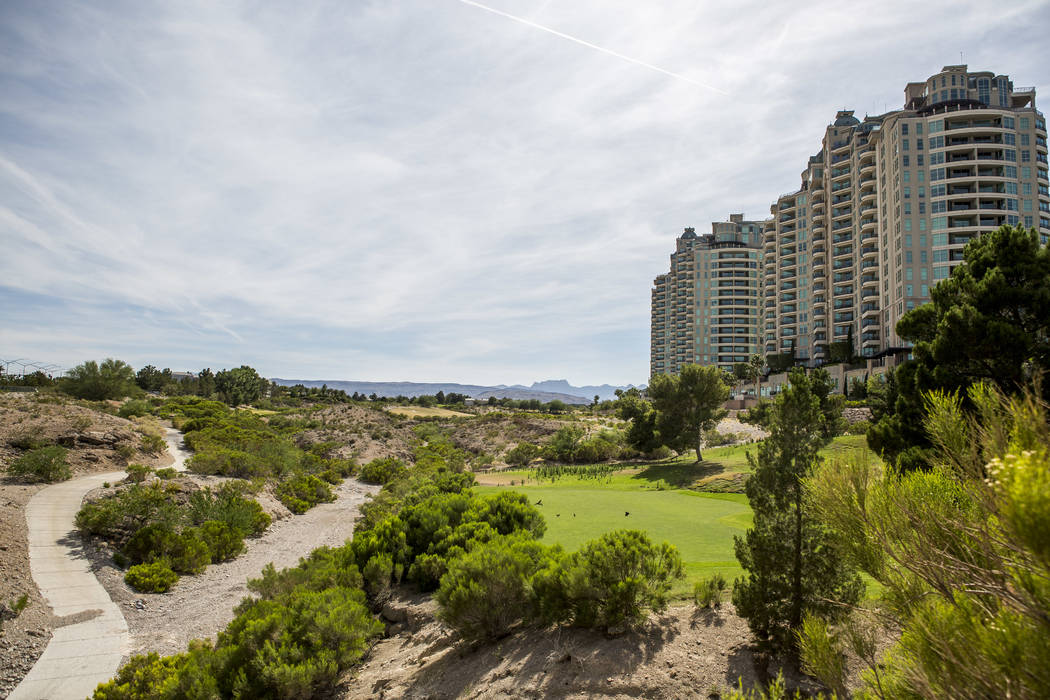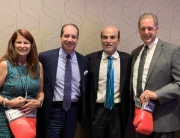BY JEFFREY MEEHAN SPECIAL TO REALESTATE.VEGAS

The list has been getting longer for the number of golf course owners in Las Vegas that have sold or entered bankruptcy in the past couple of years. Many of these courses have been attached to communities where residents feared things such as closure, redevelopment or long periods of uncertainty because of litigation.
Well-known courses such as Badlands, Legacy Golf Club and Silverstone Golf Club were just a few of the names that are set to see changes. There are roughly 60 golf courses in Las Vegas and some of the surrounding areas.
“I don’t think at this point it’s known for any of them, but they’re certainly in various stages of moving onto something different than a golf course,” said George Garcia, owner of Las Vegas-based G.C. Garcia Inc., a land planning and development services firm.
Garcia has worked with residents at Badlands, who are in opposition to the redevelopment proposals at Queensridge.
Across the nation, the number of courses has shrunk by 800 in the past decade, according to research from the National Golf Foundation. Much of this is because of lagging interest in the sport and an overabundance of golf courses.
Redevelopment efforts
The Badlands golf course in the master-planned community of Queensridge has been in a battle for more than two years.
In June, developer Yohan Lowie of EHB Cos. forced a vote on four proposals at the Las Vegas City Council that would have permitted 61 homes on 34 acres of the closed 250-acre course. Lowie threatened to stop watering the course, with withdrawing a plan to raise 2,100 condominiums at the site and selling the land if the council delayed the vote.
All were denied.
The only development approved has been for 435 condominium units at the eastern edge of the course.
The vote to approve that development led to a contentious race in June Ward 2 between Steve Seroka and incumbent Bob Beers, who was unseated.
Garcia said the development plan is heading back to the city Aug. 2.
The Legacy Golf Course was one of the latest to be sold. The new owners, Georges Maalouf and Eddie Haddad, have closed the course as of July 4, the day the course sold under Par Excellence Drive Trust LLC.
“Over the next 60 to 90 days, the representing trustees of the properties will continue open communications with the city of Henderson officials and will begin timely discussions with the neighboring businesses and residents,” said Elizabeth Trosper, representative for the new owners. “It is their intent to create a planned-use development that will be enjoyed by neighboring homeowners and provides uses that enhance the viability of the location.”
In a statement, Trosper said the clubhouse and course were closed by the new owners “due to massive financial losses, increased operating costs and declining revenue over the past several years.”
On July 25, residents of the Grand Legacy Community Association filed a motion for a temporary restraining order to prevent new development on the property. The motion maintains that deed restrictions prohibit the new owners from redeveloping the property for 50 years.
A hearing is scheduled for Aug. 3 at the Regional Justice Center at 11 a.m.
Changing industry
Golf has lost a lot of players it once captured.
According to data from the National Golf Foundation, an estimated 30 million people were playing the game. By 2011, that number slipped to 25.7 million — a little more than a 14 percent decline.
In a study done in 2015 by Sports & Fitness Industry Association, a trade association for sports and fitness brands, suppliers, retailers and partners found that the number of people that participated in a game of golf at least once that year was 24.7 million.
The higher number of golfers at one time led to many new courses being built — many of which were attached to real estate.
During the 1960s, the National Golf Foundation found that 18 percent of some 380 golf courses built annually were part of a real estate development. That went up dramatically in a boom period during the 1990s when 40 percent of golf courses were developed alongside a real estate development, according to a study by David Hueber, Clemson University, “The Changing Face of the Game and Golf’s Built Environment.”
“People, at the time (early 1990s), were looking at this gigantic demographic bubble of retirees that were going to be playing golf, and we need a golf course a day when the baby boomers start to retire,” said Jeff Woolson, managing director of CBRE’s Golf & Resort Group. “Well, they did it, there were several years where they built over a golf course a day.”
Over the past decade, many communities were built around courses, but some didn’t have enough residents to support the course to begin with — having too little residents to be able to maintain a course, he said.
“We’ve gone through a phase over the last 10 years with a lot of these golf courses closing, and it’s healthy for the industry,” Woolson said.
Golf course closures, regardless of the reasoning, can affect real estate prices and have done so in the Queensridge community with the closure of Badlands.
“As soon as the news came out that the golf course was going to be removed, people jumped on the market, they put their homes on the market,” said Diane Varney, Realtor at Coldwell Banker Premier Realty. “We had way too much supply of homes for sale in there.”
Issues with value and uncertainty can present problems for being able to sell a home or get a good price. Varney said there is a definite premium for a home that sits on a golf course, has a water feature or has a good view — sometimes gaining hundreds of thousands more dollars for sellers.
While things seem bleak in many parts of the valley for communities surrounding golf courses, some neighborhoods are getting a premium.
Varney said lots at The Summit Club in Summerlin are getting anywhere between $2 million and $10 million for custom lots on the 555-acre country club community.
One of the developers on the Summit Club in partnership with Arizona-based Wolff Co., a real estate private equity firm, made a deal at the end of 2016 to buy the Las Vegas Country Club at 3000 Joe W Brown Drive.
Other course sales, closures
Black Mountain Golf and Country Club at 500 Greenway Road, near E. Horizon Drive and Greenway Road, is another course that has run into trouble and could see redevelopment. Owners of the course filed for bankruptcy March 30, but it is still operating.
The course became troubled after the recession caused discretionary spending to slow, which affected the number of people playing at the course over the past several years, said Candace Carolyn, attorney at Clark Hill.
“Members even made loans to keep the property operating,” Carolyn said. “They’ve explored every avenue, but the bottom line is that the golf course operations are not profitable.”
The Silverstone Ranch Community Association is still in pending litigation over the closure of the Silverstone Golf Club at 8600 Cupp Drive at the end of 2015. Stoneridge Parkway LLC, which bought the property in December 2015, filed for bankruptcy not long after. In mid-April, however, its case was dismissed.
Desert Lifestyles, which bought the course and clubhouse just before Stoneridge in September 2015, closed the facility at that time. Desert was sued by Silverstone Ranch Community Association for its action, and litigation is still ongoing.
The Siena Golf Club in Summerlin has also had its troubles.
As reported in the Las Vegas Review-Journal on April 26, Dr. David Lee, one of three owners of Siena, wrote homeowners by email stating he may want to sell the course, as it’s losing money. The homeowner’s association was considering voting on the proposal.
Investment has also happened in the golf sector. Apollo Global Management LLC, a private equity firm, agreed to pay $1.1 billion for ClubCorp Holdings. ClubCorp has two holdings in Las Vegas: Canyon Gate County Club at Sahara Avenue and Durango Drive and Bear’s Best Las Vegas, which sits just west of Town Center Drive on Flamingo Road.






Recent Comments